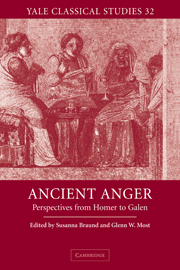Book contents
- Frontmatter
- Contents
- Notes on contributors
- Acknowledgments
- List of abbreviations
- Introduction
- Chapter 1 Ethics, ethology, terminology: Iliadic anger and the cross-cultural study of emotion
- Chapter 2 Anger and pity in Homer's Iliad
- Chapter 3 Angry bees, wasps, and jurors: the symbolic politics of ὀργή in Athens
- Chapter 4 Aristotle on anger and the emotions: the strategies of status
- Chapter 5 The rage of women
- Chapter 6 Thumos as masculine ideal and social pathology in ancient Greek magical spells
- Chapter 7 Anger and gender in Chariton's Chaereas and Callirhoe
- Chapter 8 “Your mother nursed you with bile”: anger in babies and small children
- Chapter 9 Reactive and objective attitudes: anger in Virgil's Aeneid and Hellenistic philosophy
- Chapter 10 The angry poet and the angry gods: problems of theodicy in Lucan's epic of defeat
- Chapter 11 An ABC of epic ira: anger, beasts, and cannibalism
- References
- Index of passages cited
- Index of proper names
- Index of topics
Chapter 1 - Ethics, ethology, terminology: Iliadic anger and the cross-cultural study of emotion
Published online by Cambridge University Press: 22 September 2009
- Frontmatter
- Contents
- Notes on contributors
- Acknowledgments
- List of abbreviations
- Introduction
- Chapter 1 Ethics, ethology, terminology: Iliadic anger and the cross-cultural study of emotion
- Chapter 2 Anger and pity in Homer's Iliad
- Chapter 3 Angry bees, wasps, and jurors: the symbolic politics of ὀργή in Athens
- Chapter 4 Aristotle on anger and the emotions: the strategies of status
- Chapter 5 The rage of women
- Chapter 6 Thumos as masculine ideal and social pathology in ancient Greek magical spells
- Chapter 7 Anger and gender in Chariton's Chaereas and Callirhoe
- Chapter 8 “Your mother nursed you with bile”: anger in babies and small children
- Chapter 9 Reactive and objective attitudes: anger in Virgil's Aeneid and Hellenistic philosophy
- Chapter 10 The angry poet and the angry gods: problems of theodicy in Lucan's epic of defeat
- Chapter 11 An ABC of epic ira: anger, beasts, and cannibalism
- References
- Index of passages cited
- Index of proper names
- Index of topics
Summary
To study the emotional language of another culture is to enter into the most significant questions raised by the study of emotion, since it raises the fundamental issues of the universality or cultural specificity of the emotions and of the contribution made by linguistic labels and categories to the construction of emotions as cultural phenomena. It is thus the responsibility of the classicist who would study the emotional terminology of the Greeks or the Romans also to become familiar with current research on the nature of emotion in other disciplines and to situate the study of ancient terminology in a wider context in which full account is taken of aspects of emotion other than the sense and reference of particular linguistic markers. It has to be said that this is a responsibility that, more often than not, is shirked by the cultural determinists who currently dominate both classical studies and the humanities in general. Their approach assumes that all significant features of a culture are products of conditions specific to that culture; and since this holds both of the culture under investigation and of the investigator's own, it requires the investigator somehow to seek access to phenomena wholly specific to a society that is alien to his/her own experience.
- Type
- Chapter
- Information
- Ancient AngerPerspectives from Homer to Galen, pp. 11 - 49Publisher: Cambridge University PressPrint publication year: 2004
- 15
- Cited by

